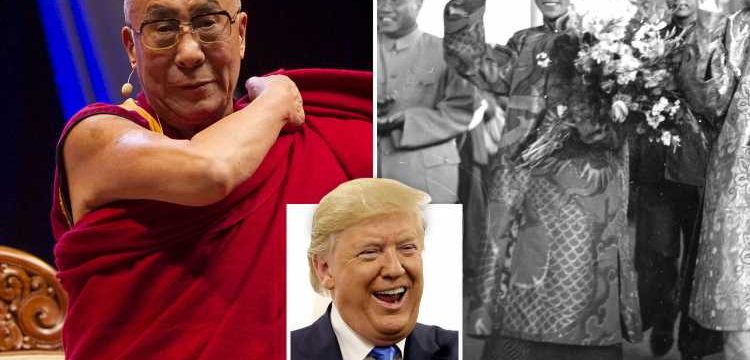CHINESE authorities abhor the Dalai Lama but his many devotees – who consider him as a living Buddha of compassion – venerate their spiritual leader.
Here, we look at the monk's background and how his opinions on Donald Trump have recently changed.
Who is the Dalai Lama?
The Dalai Lama, Tibet's current spiritual leader, is branded by Beijing as a dangerous separatist.
Tenzin Gyatso – his spiritual name – was born as Lhamo Thondup in 1935 to parents who farmed buckwheat and barley in an isolated mountain hamlet, on the northeastern edge of the Tibetan plateau, Taktser, in Qinghai province.
He was acknowledged as the reincarnation of the 13th Dalai Lama when he was two years old.
As a toddler, he recognised objects belonging to the 13th Dalai Lama, which resulted in lamas proclaiming him as celestial heir.
Tibetan Buddhists believe that the Dalai Lamas are the manifestation of the Buddha of Compassion and are enlightened beings, who have chosen to take rebirth (reincarnation) in order to serve humanity.
The first Dalai Lama was identified in the 15th century.
At the age of just four, he was taken from his parents to start daily spiritual training at a monastery.
When China’s Mao troops invaded Tibet in 1950, he was forced to assume political power even though he was aged 15. In the past, Dalai Lamas have also served as the political leaders of Tibet.
But, in 1959, when Tibetans took to the street to publicly protest against the Chinese rule, thousands were killed by troops.
With rumours circulating that he would be kidnapped or assassinated, the Dalai Lama fled to India on foot after the failed uprising.
And he hasn't set foot in Tibet ever since.
In occupied Tibet, any sign of loyalty to the Dalai Lama can be met with arrests, lengthy sentences, torture, violent crackdowns and "re-education" programmes.
China says its leaders have the right to approve his successor, as a legacy from China's emperors.
But the 83-year-old Nobel peace laureate monk, who lives in exile in the northern Indian hill town of Dharamshala, has said that his incarnation could be found in India after he dies, and that any other successor named by China would not be respected.
He dreams of returning home to Tibet, but his life’s ambition is unlikely to fulfilled, as China has dismissed him as a "wolf in monk's robes".
What are his opinions on Donald Trump?
With the Dalai Lama approaching his 84th birthday on July 6, the BBC interviewed him at his home, high in the mountains.
He said: “One Chinese official once called me a demon. When I first heard that, my response was, ‘yes, I’m a demon with horns’.”
The Dalai Lama told the broadcaster he “pities China’s ignorance”, slamming the government’s political thinking as “very narrow-minded indeed”.
When talk turned to American President Donald Trump, it soon appeared that he had done an about-turn on the leader, who three years ago said he had “no worries” about a Trump presidency.
Now, though, Nobel Peace Laureate monk considers the US leader as displaying a “lack of moral principle” during his time in office.
His change in attitude partly stems from Trump’s apparent snubbing of him as he’s never asked to meet the spiritual leader, who is chums with many a celebrity, including Richard Gere – a fellow Buddhist.
He told the BBC: “When he became president he expressed America first. That is wrong.”
Plus, he’s upset about the withdrawal from the Paris climate accord, and migrant kids being locked up, saying such images make him feel “sad”.
"America, they should take the global responsibility," he said.
What else did he say in the interview?
He said that he backed women’s rights and called for equal pay in the workplace.
In his interview with the BBC on June 27, he reiterated comments made three years ago, when he said that he was open to a female successor but, controversially, that she "must be attractive, otherwise it's not much use".
Asked whether he could see why a lot of women found the original comments upsetting, he laughed and said: "That is one time.
"If female Dalai Lama comes, then she should be more attractive."
He then agreed with interviewer Rajini Vaidyanathan that character was also important.
The Dalai Lama also sparked controversy by saying in the same interview that Europe would become Muslim if refugees didn't eventually leave.
"European countries should take these refugees and give them education and training," he said.
"And then [the aim] is… [for them to] return to their own land".
Asked whether refugees should be allowed to stay in Europe if that's what they would prefer, he added: "Limited number… OK. But whole Europe eventually become Muslim country? Impossible.
"Or African country? Also impossible."
Source: Read Full Article




